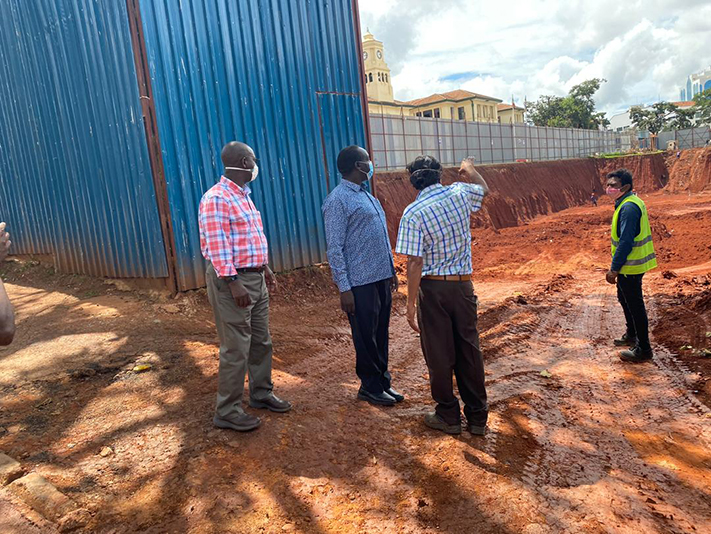The ongoing lockdown over the COVID-19 pandemic notwithstanding, works at the site for the planned construction of the Supreme Court and the Court of Appeal remain on course.
Excavation works ahead of the planned construction at the Judiciary Headquarters in Kampala are almost complete and the construction of the raft foundation slab and pads should be complete within the month of May, according to Dr. Eng. Christopher Ebal, Judiciary’s Commissioner for Engineering and Technical Services.
While taking Mr Pius Bigirimana, the Permanent Secretary and Secretary to the Judiciary, on a guided tour of the site on Friday (May 8), Dr Eng. Ebal said the contractor is working around the clock to ensure works are on schedule, while taking necessary precautions in line with the COVID-19 directives.
Seyani Brothers is executing the construction of the seven-storey Twin Appellate Courts buildings with two-basement floors and parking for 226 vehicles, expected to be completed within 24 months, at the cost of shs63.9 billion to be paid for by the Government of Uganda.
Mr Bigirimana said: “I have maintained my office work routine to ensure that everything keeps running here. This is a very important project for both the Judiciary and the country and we wouldn’t even want the prevailing circumstances to affect or delay the project.”

Dr. Ebal said by end of May, the base slab will be complete and “everything will be in motion”.
With the buildings in place, Mr. Bigirimana said the Judiciary would save at least Shs6 billion it pays annually in rent for the appellate courts. The structures will be customized courthouses with modern courtrooms, chambers for the justices, mediation rooms, a gym and restaurant, among other amenities.
While presiding over the groundbreaking ceremony on December 5, 2019, the Chief Justice, Bart M. Katureebe, said the project was part of a larger one, which aims at ensuring that the Judiciary is transformed.
“This project started in 1999 and has moved through many stages including the use of Public Private Partnership. I am therefore glad that this project constitutes part of the measures that the Judiciary is undertaking to meet the service level expectations from our customers by providing physical access to justice,” he said.